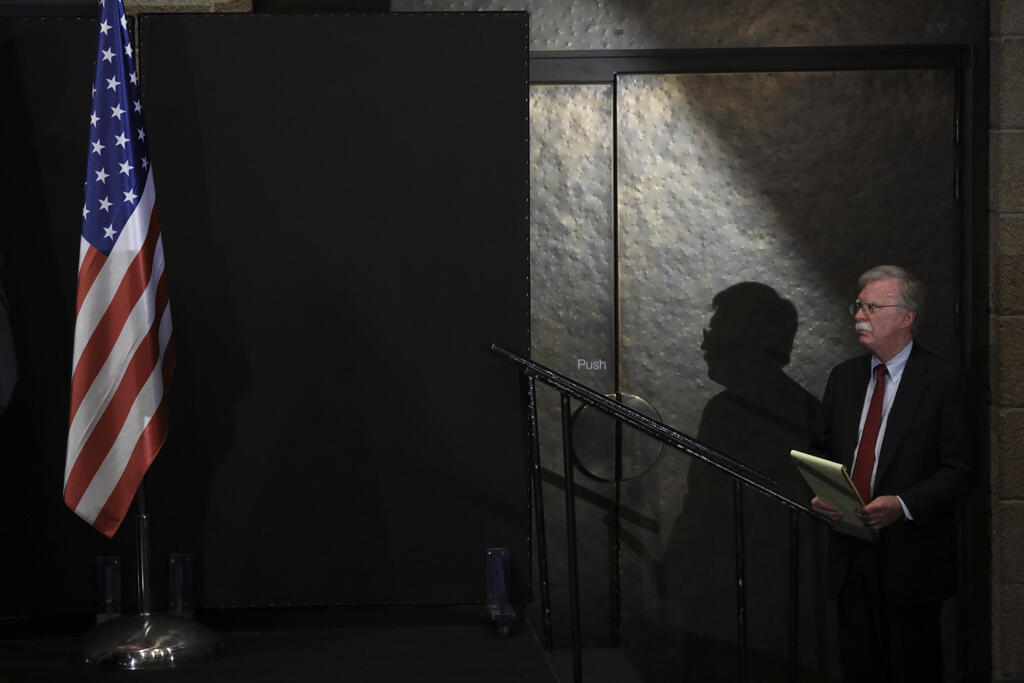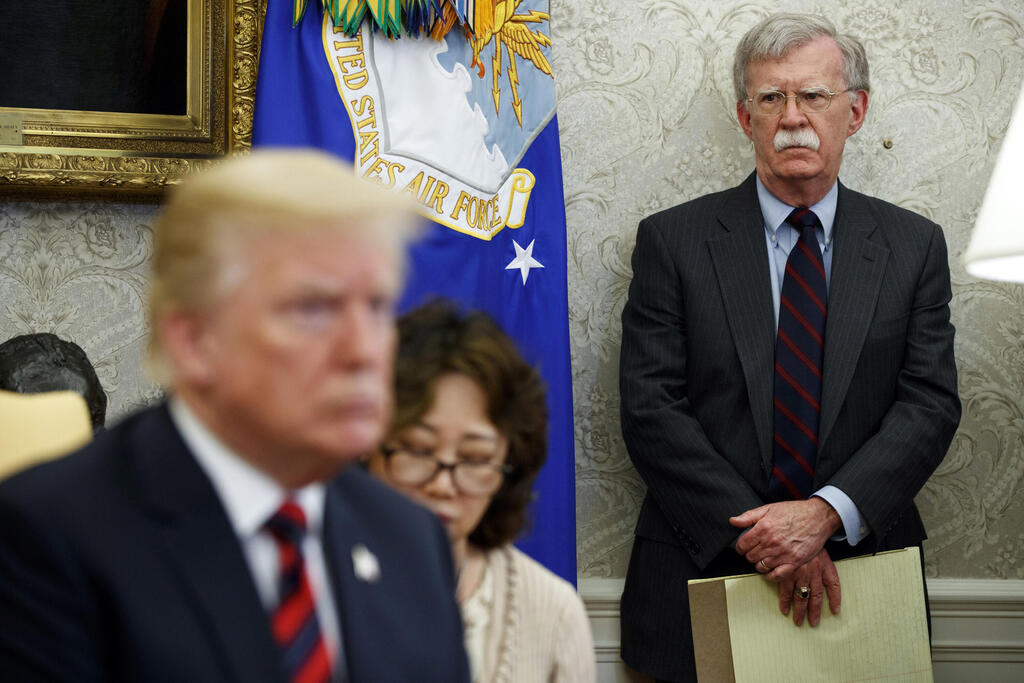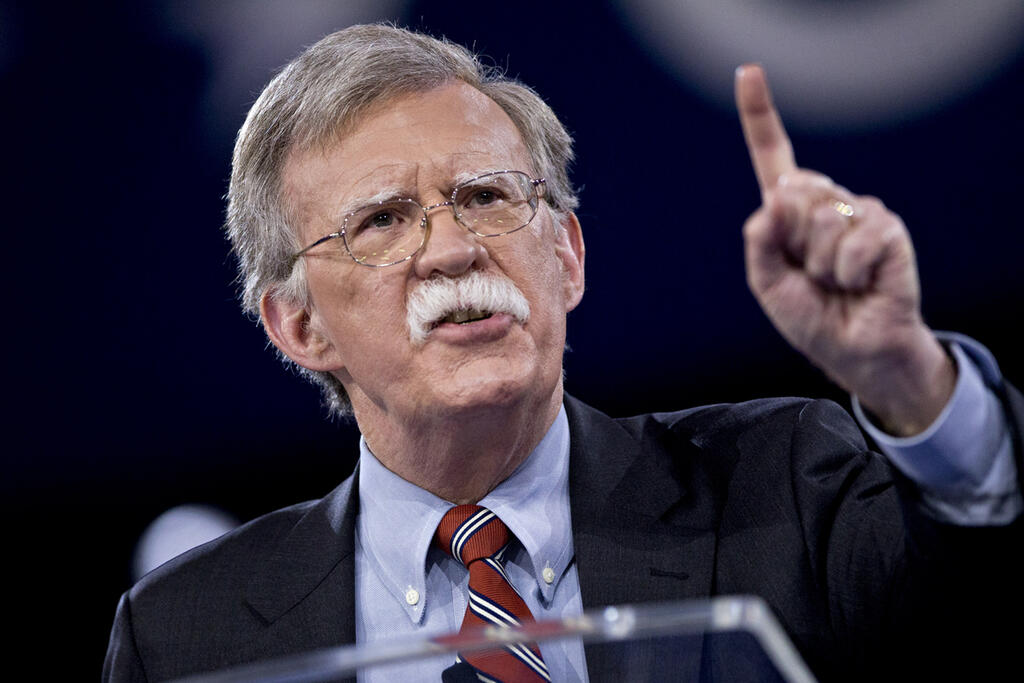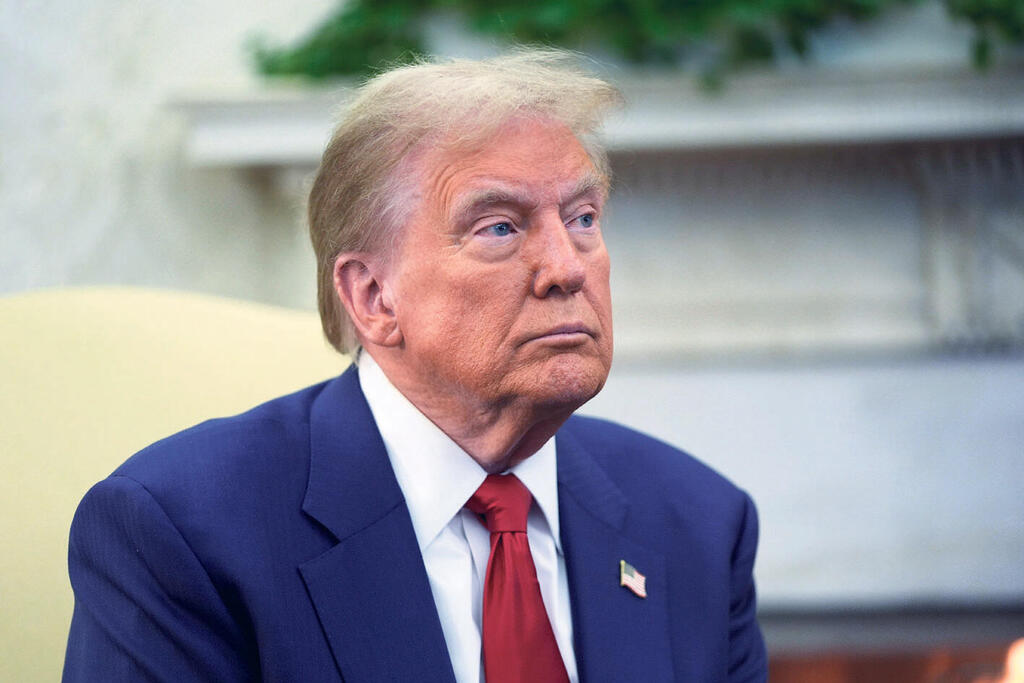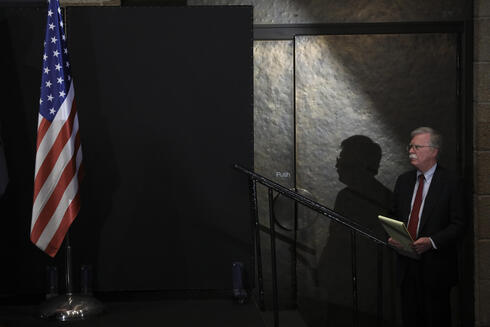
John Bolton: “Donald Trump unfit” to lead the nation
John Bolton knows Donald Trump intimately, having served as his national security advisor. Now, after serving for 40 years in senior positions in both the administration and at the United Nations, it’s crucial for Bolton, a long-time Republican, to warn against the president-elect. Trump “sees things almost exclusively through the prism of his own self-interest” and, to get what he wants, will have no problem breaking agreements, igniting a trade war, and undermining order both at home and abroad. Fasten your seatbelts; it’s going to be a bumpy ride.
"Donald Trump is unfit," says senior diplomat John Bolton in an exclusive interview with Calcalist. The statement is particularly striking, considering it comes not from a liberal Democrat but from a staunch conservative Republican who has served in the public sector for decades, including as Trump's national security advisor during his first term.
"He sees things almost exclusively through the prism of his own self-interest, episodic, transactional, and lacking any coherent philosophy on foreign relations or anything else," Bolton asserts. "Just look at his cabinet appointments — he doesn’t care about their positions because he doesn’t think it matters. Only what he wants matters. The common denominator for all his appointments is their answer to one question: will they bow to him? Will they be ‘yes men’? He doesn’t want people saying to him, 'Mr. President, have you considered this or that alternative?' or 'Are you aware of this fact?' He wants people to do exactly what he wants, exactly when he wants it — and that is neither in the best interest of his presidency nor of America."
Bolton, 76, served under Trump from April 2018 to September 2019 — a relatively brief tenure of 17 months, but still the longest period anyone held that position in the tumultuous Trump administration. His reservations about Trump, who will be sworn in as the 47th president of the United States next month, are not new. In 2020, Bolton published the bestselling memoir The Room Where It Happened: A White House Memoir, in which he revealed shocking claims about Trump's behavior and decision-making. Among other things, Bolton alleged that Trump: Tried to block investigations into companies from Turkey and China as personal favors to their leaders, Recep Tayyip Erdogan and Xi Jinping; Asked Xi to buy more American agricultural products to help secure his victory in the 2020 election; Suggested that journalists should be jailed and executed; Did not know that Britain possesses nuclear weapons; Asked if Finland was part of Russia.
Bolton is far from the only former Trump confidant sounding the alarm. In October, just before the election, John Kelly, Trump's former White House chief of staff, declared that he fits “into the general definition of fascist.” Omarosa Manigault Newman, Trump's former communications director, called him "racist, extremist, and misogynistic" in 2018. Miles Taylor, the former chief of staff at the Department of Homeland Security, anonymously published a scathing book in 2019 likening Trump to "a 12-year-old boy running an air traffic control tower" and later publicly urged Americans to vote for Joe Biden. These are just a few of the many former insiders who have come forward with similar critiques.
However, of all these former allies turned critics, Bolton is arguably the most prominent and experienced. His government career began in 1981 under President Ronald Reagan, and his extensive background lends weight to his warnings. Since the publication of his memoir, Bolton's criticism of Trump has only grown sharper and more unrelenting.
Do you agree with Kelly's assertion that Trump is a fascist?
"A true fascist has a philosophy — they know what they think about a lot of things. With Trump, it’s just ‘I want what I want.’ When he says he wants to imprison Liz Cheney and the rest of the January 6th Committee, it’s an authoritarianmove, of course. But that doesn’t mean he intends to impose such punishments on everyone."
It’s not just Liz Cheney or the congressional committee. Trump has been targeting anyone who criticizes him, including journalists and political opponents.
"That’s true. These are his immediate goals, and there’s no justification for them. They’re illegitimate and extremely damaging to the American Constitution. But it’s not because he wants to create a dystopian '1984'-style society. He’s not Benito Mussolini or Adolf Hitler. He couldn’t have written Mein Kampf — he doesn’t even have the attention span to read that much. His vision doesn’t extend beyond his immediate self-interest. People fear there won’t be checks and balances in his second term, but the reality is that Trump’s own limited imagination acts as a check on his ambitions."
When you say he’s incompetent, what do you mean?
"The late political commentator Charles Krauthammer once told me during Trump’s first term, ‘I misjudged him. I thought he had the maturity of an 11-year-old. Now I realize I was off by a decade — he’s more like a one-year-old, constantly asking, What’s in it for me?"
And yet you accepted his offer to become his national security advisor. Why?
"Because I assumed that, like his predecessors, he would be disciplined by the weight of the responsibility — especially in a critical area like national security —. But it turned out that nothing disciplines Donald Trump."
"Trump doesn’t understand alliances. He thinks we’re just protecting others."
The Trump administration’s Justice Department made extensive efforts to block Bolton’s book from being published, including seeking a court order to prevent bookstores from selling it. Trump himself lashed out on Twitter and television, accusing Bolton of lying, breaking the law, and revealing classified information. (The internal contradiction, of course, escaped him: if the claims were lies, how could they also be classified?) Trump labeled Bolton "a bitter, boring fool," accused him of wanting war, and claimed, "What an idiot!" He also falsely stated that George W. Bush had fired Bolton for being "boring" and "crazy."
These controversies have kept Bolton in the public eye. In recent months, he has been a regular guest on CNN and NBC, often asked the million-dollar question: What would Trump’s second term look like? Bolton frequently responds with a quote from Winston Churchill: "You can always count on Americans to do the right thing — after they’ve tried everything else." Bolton adds, "Trump is the ‘everything else,’ and we will have to manage him for four years. Fortunately, America still has the resilience to overcome its enemies."
What can we expect in Trump’s first days after inauguration?
"It’s almost certain he’ll pardon those accused of participating in the January 6 Capitol riots. Beyond that, he will likely focus on immigration, a signature issue from his first term. His initial attempts to restrict immigration didn’t go as planned, but after four more years to prepare, I expect he’ll make it a top priority this time."
What about NATO? Will Trump make good on his threats to leave the alliance?
"It’s a very real possibility. Trump often says, ‘I won’t leave NATO unless the allies pay their fair share,’ but of course, he determines what that share is. He fundamentally doesn’t understand defense alliances. He thinks we’re just protecting Europe without getting anything in return. He has similar views on other bilateral alliances. The only question is whether he can be distracted for the next four years."
The economy, tariffs, and a potential trade war
Trump’s economic policies are another contentious issue, particularly his plans for tariffs. In November, he announced his intention to impose an additional 10% tariff on China and 25% on Canada and Mexico.
"Trump himself doesn’t know the specifics of his tariff policies," Bolton says. "The numbers change daily. One day, it’s a blanket 10% tariff on all imports. The next, it’s 20%. A week later, it’s 25% on everything from Mexico and Canada, and 60% on China — or maybe just 10%.
"What motivates him to push for tariffs is his desire to extend the 2017 tax cuts, which I think is a good idea. But during the congressional budget process, these tax cuts will be accounted for as lost revenue. To offset that, Trump’s team tells Congress, ‘We’ll make up for the revenue loss with tariffs,’ implying very high tariff revenues. This means imposing broad and significant tariffs, which could lead to a trade war."
And that won’t go quietly.
"Exactly. Unlike his first term, the Europeans have indicated they’re ready to retaliate if tariffs are imposed. China, too, will respond more aggressively this time. There’s a serious risk of a trade war that could quickly escalate and be difficult to de-escalate. This is a huge concern. People shrug it off, saying, ‘This is just how Trump negotiates.’ But once tariffs are in place, the economic consequences are real and significant. Trump’s ultimate judgment will come from the American public — if the tariffs lead to a trade war, it will become a major problem for him."
It’s not just about the trade war. In a recent interview with NBC, Trump was confronted with the fact that the protective tariffs he imposed during his first term cost American consumers roughly $80 billion. Companies like Walmart have already announced that new tariffs will force them to raise prices. When asked if he could guarantee that American families wouldn’t bear additional costs, Trump initially replied, "I can’t guarantee anything." Later, he contradicted himself, claiming the tariffs wouldn’t cost Americans anything at all.
Trump loses loyal Israel supporter and hawkish Republican
John Bolton lives in Bethesda, Maryland, with his partner, Gretchen. Born in Baltimore, Maryland, he is the son of a firefighter and a housewife. Bolton attended Yale on a full scholarship, graduating summa cum laude in law and becoming the first person in his family to obtain a college education. His political views were shaped early — at 15, he volunteered for Republican Senator Barry Goldwater's presidential campaign. At 33, he entered government as a lawyer on the team overseeing the transition between the Carter and Reagan administrations, which led to a long career in public service. "I got into politics at a very young age because I cared about philosophy and policy," Bolton said in an interview with PBS. "I understand it’s hopelessly idealistic, but that’s what drives me."
During George H.W. Bush’s presidency, Bolton moved to the State Department as Assistant Secretary for International Organization Affairs. From 1989 to 1993, he notably blocked Palestinian efforts to rebrand their delegation from the PLO to Palestine and gain statehood recognition in various UN sub-organizations. His views on the Palestinian issue remain consistent.
“I was in Geneva in 1989 when the Palestinian Authority first tried this trick, and I was glad the United States led the effort to stop it,” Bolton said recently. “They’re trying again under the weak Biden administration, thinking they can push this through, but there’s already anger in the House and Senate. Solidarity with oppressed people isn’t relevant here. The two conditions for UN membership are being a peace-loving state — the Palestinians are neither.”
With Bill Clinton’s election, Bolton moved to the private sector, becoming a law firm partner. He returned to public service in 2001 under George W. Bush as Undersecretary of State for Arms Control and International Security Affairs, where he focused on preventing the proliferation of weapons of mass destruction. In 2003, he joined the Six-Party Talks on North Korea's nuclear weapons, but his blunt remarks about Kim Jong-il being a "tyrant dictator" led to his removal from the delegation. Bush supported him despite the controversy.
"Trump wants to flatter his base, but he’s not anti-Semitic"
One of Bolton’s most prominent roles was his tenure as U.S. ambassador to the United Nations in 2005-2006. Even during his confirmation, Joe Biden, then a senator, criticized him: "My problem with you over the years is that you’re too qualified. I’d rather you were stupid and ineffective."
At the UN, Bolton emerged as a staunch supporter of Israel, blocking numerous resolutions against it and advocating for a free hand during the Second Lebanon War. In May, he commented on the current conflict, saying, "Israel must enter Rafah," despite international criticism. Now, with the Assad regime in Syria overthrown, Bolton believes it’s time to eliminate Iran’s nuclear program.
“The fall of Assad is a huge victory for Israel and the U.S. It’s a blow to Iran’s influence in the Middle East,” he said. “The concern is that terrorists who overran Damascus could establish a terrorist state bordering Israel, Lebanon, and Jordan. The recent actions by Israel and the Biden administration — attacking ISIS in Syria and neutralizing chemical weapons — are prudent. Until there’s clear evidence that Tahrir al-Sham isn’t linked to al-Qaeda, we should assume it is.”
What do you think Trump will do about Iran?
“I’m guessing that in Trump’s conversations with Netanyahu in recent weeks, they talked about what Israel should do by January 20th and after that. If you listen to Joe Biden, the ceasefire with Lebanon is a permanent ceasefire, and if you listen to Netanyahu, it’s a 60-day ceasefire, which brings you right after January 20th. I think it’s in the Israeli and American interest to destroy Iran’s nuclear weapons program and that this is the right time to do it, there will never be a better opportunity. There’s evidence from the last few days, since the Assad regime fell, that the Revolutionary Guards and the Iranian military have been engaged in pointing fingers at each other about who lost Syria. The way to bring down the Iranian regime is to cause a split at the top. The regime is very unpopular, but people don’t have guns. If the military and security forces disintegrate and start going at each other, the regime could fall.”
Would Trump opt for an attack or diplomacy?
"You never know with him. During his campaign, he said he was not seeking regime change in Iran, and that was his policy in his first term. I think that's a mistake. I don't think it's possible to achieve peace and security in the Middle East as long as the ayatollahs are in power in Tehran."
Can Trump negotiate with Iran?
"When Trump withdrew from the nuclear deal in 2018, he told European leaders that he was willing to negotiate a bigger and better agreement on the nuclear program, one that also included a reference to terrorism and ballistic missiles. It sounds amazing, but the Iranians will never agree to that. The reality is that you can pursue an agreement for a long time, and that time only allows the regime to consolidate its power further and further.
"In my opinion, Trump must step up the enforcement of sanctions, because even during the period of maximum pressure, as he called it, we did not really apply maximum pressure. The enforcement of sanctions by the United States is a sore point. It is weak and ineffective. It needs significant change, but there is always the risk that he will agree to some kind of negotiation. At the G7 summit in Biarritz in August 2019, he was literally millimeters away from meeting with Javad Zarif, who was then the Iranian foreign minister (mediated by Emmanuel Macron). The temptation to get what he will undoubtedly call the 'Deal of the Century with Iran' is something Trump cannot resist."
Some argue Trump is anti-Semitic. What’s your take?
"Trump sees the world in simplistic terms. His reluctance to condemn anti-Semitism is about appeasing his base. But he has a Jewish daughter and son-in-law (Jared Kushner) whom he treats as family.
"When I was an advisor to Trump, he told me that his father, who was a real estate mogul, would put up apartments for sale for $12,000. A potential Italian buyer would say to him, 'This is the most beautiful house I've ever seen, literally the house of my dreams, but I can't afford it,' and Trump Sr. would negotiate with him and sell him the house for $10,000. On the other hand, a potential Jewish buyer would say, 'This is a terrible, crappy house, poorly built. I won't pay a cent more than $8,000 for it,' and Trump Sr. would negotiate with him and sell him the house for $10,000. So that's how he thinks about Italians and Jews, and maybe it's a hangover from the days when people weren't so sensitive about these things, but I don't think it's an expression of anti-Semitism. I think it's another expression of Trump's focus on the thing he cares about most — which is Donald Trump."
"Trump has a short attention span. If he doesn't get what he wants, he moves on."
The inner circle forming around Trump suggests his second term would be entirely different from his first. These are individuals for whom the term "controversial" is an understatement. From Pete Hegseth, a Fox News anchor appointed Secretary of Defense, to Elon Musk, who will serve as Director of the Department of Government Efficiency — it’s disturbing, isn't it?
“Trump is just looking for people who will do what he tells them to do. Even if they’re a bit unconventional, underqualified, or living in their own fantasy worlds, like some of the people he’s appointed — it doesn’t matter to him. In the end, he knows that when he tells them to do X, they will do it, and that’s all that matters.
“It's important to note that some of the appointments are still solid. For example, Marco Rubio as Secretary of State, Michael Waltz as National Security Advisor, Doug Burgum as Secretary of the Interior, and Scott Bessent as Secretary of the Treasury, who is very knowledgeable about both national and international economics.
“As for Musk specifically, he won’t head a government department. During the Reagan administration, there was a committee led by Peter Grace, the CEO of the chemical company WR Grace and Company. Similarly, in the Truman administration, the Hoover Commission worked to end government inefficiency. So Musk won’t have executive authority. Instead, he will assess the government and make recommendations. A fresh perspective could be beneficial.”
What will America look like in 2028 when Trump leaves office?
"It’s hard to say. The real challenge for Trump in domestic American terms will be everything that needs to pass through Congress. Republicans hold a very narrow majority in the House, and by the 2026 midterms, that majority could disappear. Governing is difficult. It’s one thing to be an outsider or a political candidate and criticize everything. It’s another to be in government, facing the reality of limitations and the obstacles that need to be overcome to achieve goals. Trump has a short attention span. If he can get what he wants quickly, great. If not, he tends to just move on to the next thing.”
Will he even last the rest of his term?
"He won’t be removed unless the Democrats secure a two-thirds majority in the Senate, which was their challenge in both impeachment attempts. The way they conducted themselves, they had no chance of achieving that majority, as the Constitution requires. The first impeachment attempt was poorly executed because they excluded Republicans and made no effort to win them over. When you try to remove a president and fail to convict him in the Senate, like with Trump, it just fuels his support."
Do you see yourself ever returning to the White House?
"I’m not expecting a call from Trump, if that’s what you’re implying. Based on my past experiences with him, I wouldn’t accept the offer either, because I can’t ignore history. If there were a national emergency, everyone would be mobilized, but I hope we don’t face any emergencies so dire that Trump would need to call me."
You write in the book that Trump told you he had no problem with your mustache because his father had one too.
"Yeah... there’s something deeply Freudian about it. I’m not sure what it is, but I just let it go."









